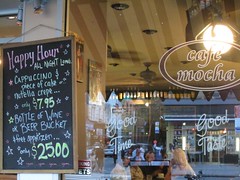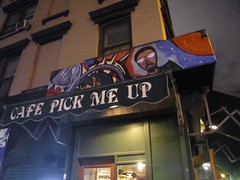Liquor licensing is the hot topic in the East Village, with some residents railing against the noise and violence that they say booze brings.
But cafe owners looking to put alcohol on their menus to make money said that applying for a license is a head-spinning process that often ends with them being painted as villains.
Take the Case of Table 12, the 24-hour diner on Avenue A and East 12th Street. On Sept. 20, the liquor authority committee for CB3, which represents the East Village, refused to recommend Table 12’s application to the State Liquor Authority to sell beer and wine. On Sept. 28, the full board upheld the committee’s decisions on a number of East Village liquor license applicants, including the denial of Table 12.
A brother of Table 12’s owner, who identified himself only as Tarik, said that the diner’s license application was submitted to help give patrons a “better dining experience” and also for the profit potential.
“It’s why the place is open for business,” he said. “A cafe is not open for non-profit.”
But District Manager Susan Stetzer said that the committee refused Table 12 for several reasons, including public opposition in the way of protests at both the committee and full board meetings.
She also said that the owners of the diner had reneged on an earlier pledge to the community board that they would not seek a beer and wine license.
Table 12’s owner declined to comment.
Ost Cafe, just across the intersection from Table 12, faced a similar situation when its owners applied for the license before their 2008 opening.
“It doesn’t surprise me,” Aaron Hagedorn, co-owner of Ost, said when told about the Table 12 decision.
 Molly O’Toole Despite neighborhood protests, Cafe Mocha, at Second Avenue and East Seventh Street, had its permission to sell liquor extended outdoors.
Molly O’Toole Despite neighborhood protests, Cafe Mocha, at Second Avenue and East Seventh Street, had its permission to sell liquor extended outdoors.“Their first reaction is always no,” Mr. Hagedorn said of the liquor committee. “I would never go to a board meeting unless I needed to go because it’s one of the worst experiences I’ve ever had in my life.”
He described the board’s approach as guilty until proven innocent, with owners forced to defend their license applications in a neighborhood that is already dense with bars.
According to state law, when applying for an alcohol license, an applicant must notify and appear before the appropriate community board. But for both a beer and wine and full liquor license, the board’s decision to recommend the applicant is only advisory, though often important for the community’s reception of the business.
The community board’s opinion becomes part of the official application reviewed by the state liquor authority.
Mr. Hagedorn said that Ost Cafe’s application to sell beer and wine was ultimately approved by the state liquor authority without a recommendation from the community board. The owners of Table 12 might be able to gain a license through that same route, he said.
Cafe Pick Me Up, at the corner of Avenue A and East Ninth Street, is one example of liquor licenses “grandfathered” into the neighborhood. Its beer and wine license, approved for the address, has been transferred through various owners for about 15 years, according to Pier Luigi, one of the owners of the cafe.
Mr. Luigi said that residents may feel that enough liquor licenses have already been granted to local businesses.
 Molly O’Toole Cafe Pick Me Up, at the corner of Avenue A and East Ninth Street has a liquor license that has been “grandfathered” for about 15 years.
Molly O’Toole Cafe Pick Me Up, at the corner of Avenue A and East Ninth Street has a liquor license that has been “grandfathered” for about 15 years.“The community is always concerned because there is a lot of establishments that serve alcohol,” said Mr. Luigi. “The reason is because of pollution, quality of life of the neighborhood.”
Despite neighborhood protests, Cafe Mocha, at Second Avenue and East Seventh Street, had its permission to sell liquor extended outdoors — the establishment already had its beer and wine license, and a “sidewalk cafe” designation, according to Jesse Ballan, the cafe’s owner.
Mr. Ballan said that because of the complexity of the process, he used a lawyer from the outset. He met no problems – until he was fined $2,000 dollars for serving alcohol outside.
“I didn’t know — I was already paying for the property inside and out, it was legally done,” said Mr. Ballan. “But the minute you step outside the rules change.”
Despite the difficulty of the application process, Mr. Ballan said that it is sometimes an essential step for East Village business owners who want to stay competitive with others who sell beer and wine.
“You can’t live on espresso alone,” said Mr. Ballan of his neighboring businesses. “If they cannot serve, they’re going to suffer.”
His advice for those about to apply? “You need a lawyer.”
What do you think of the liquor licensing rules?



